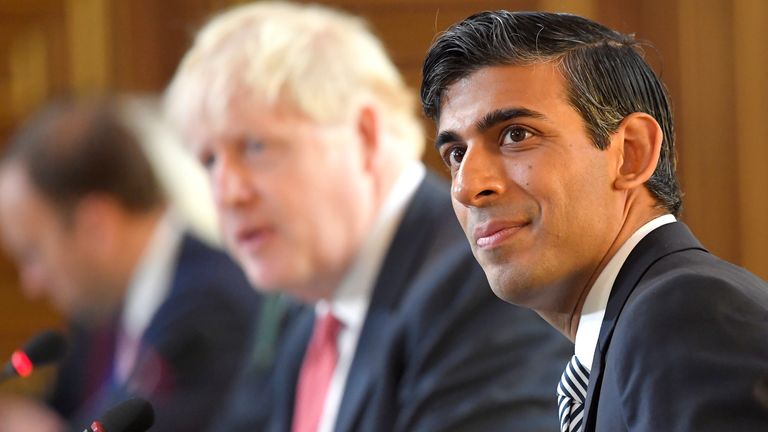With the slowest recovery in the G7, a £300bn hole in the public finances and millions at risk of unemployment as he prepares to turn off the furlough taps, Rishi Sunak can be excused for seizing on any positive portents for the economy.
The crumb of comfort sustaining him in the latest GDP figures was growth of 2.1% in March, not enough to offset a COVID-19 lockdown-induced contraction of -1.5% during the first quarter of the year, but more than expected and a sign, if nothing else, that Britain is getting better at lockdowns.
The contraction during the third shutdown of an awful 12 months was smaller than in the first, evidence that businesses and consumers have become more resilient, and better at trading and spending through severe disruption.
For the chancellor it was also a sign that consumers are ready to drive genuine recovery as restrictions ease.
An estimated £140bn in household savings has been built up by those fortunate enough to have hung on to their jobs, more than the free cash on corporate balance sheets, and he thinks we’re ready to spend it.
There will be no repeat of Eat Out To Help Out, the chancellor perhaps reasoning that the vaccination programme will prove a more effective stimulus than a fiver off lunch.
“We’ve managed to protect a lot of household incomes and you see that in the recent economic figures and I think that bodes well for the rest of the year,” he told Sky News.
“Our plan is working, consumers have built up savings, though obviously that’s not evenly distributed.
“What we now know, which we didn’t a year ago, is actually as things open up people do want to get out and go back to do the things that they used to do. I think we will see that in the coming weeks and months as we are already seeing that in today’s figures.”
That the economy should grow when businesses are permitted to re-open and people to leave home, ought to be a given and will not in itself be a sign of success.
The economy is still 8.7% smaller than pre-COVID and the recovery, like the impact of the pandemic, will not be even.
Those with the least are likely to be the most in need of continued support as the economy adjusts to a new normal.
What that looks like remains unclear and there are many questions the chancellor cannot yet answer.
How many of the three million people still on furlough will move to the dole queue when support is withdrawn fully in September?
What is the future of the office, and the fate of town and city centre businesses, not to mention public and private transport networks, in a world of hybrid white-collar work?
And hardest of all, is this really the last lockdown?
Given all that uncertainty it is hard to look too far ahead.
But if the vaccine rollout keeps the roadmap on course it is possible to glimpse a summer of recovery.
Add further easing of foreign travel restrictions, a change in the weather and a decent run for the three home nations at Euro 2020, and Mr Sunak may even raise a glass as we do likewise.









